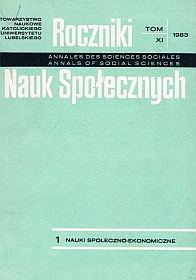Nauka społeczna Kościoła na temat związków zawodowych i innych form emancypacji świata pracy (ze szczególnym uwzględnieniem encykliki Jana Pawła II Laborem exercens)
Abstrakt
In the paper the author shows that an outline of the Christian concept of trade unions was made by Bishop Emanuel von Ketteler at the turn of the 19 th century. Pope Leon XIII’s assent of the right to form trade unions and his recognition of the right as a natural one had a significant influence on the development of the trade union movement, since at that time creating trade unions was formally banned. Pope John XXII’s statement that the right to form trade unions permits also formers to associate in their own unions is in the author's opinion exceptionally original in the social doctrine of the Church. The author also extracts some interesting elements concerning trade unions from Pope Paul Vi’s pastoral letter called Octogesima adveniens. According to Pope Paul VI, the concern about the welfare of the state is one the fundamental tasks of trade unions. In the paper the encyclical Laborem exercens is considered to be a synthesis of the social teaching of the Church on trade unions. A special notice should be given to the emphasis of the independent character of trade unions from political parties, made in the encyclical. The last chapter of the Pope’s writing called „The Insufficiency of the Theory of Trade Unions” seems to be most interesting. It says that trade unions, however important for socio-economic life of the country, imply some relic of the past in the separation of capital and labour. The process of the emancipation of the working world should lead to a different form — the workers’ democracy, which is something more than trade unions since it ensures workers participation in the government and control of the business establishment and further in the control of national economy.
Copyright (c) 1983 Roczniki Nauk Społecznych

Utwór dostępny jest na licencji Creative Commons Uznanie autorstwa – Użycie niekomercyjne – Bez utworów zależnych 4.0 Międzynarodowe.


